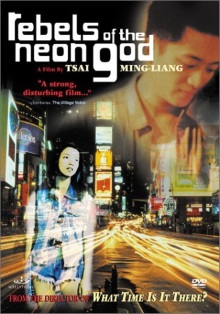
This film by Tsai Ming-Liang is his very first full-length work and the beginning of his collaboration with his long-time muse Lee Kang-Sheng. It shares similar themes with his others works and while it isn’t as sophisticated as his later works, there’s a sort of effortless flow in it that makes it highly engaging. I was also amused that the “Neon God” of the English title refers to Nezha, a god in Chinese folklore.
Hsiao Kang is the son of a taxi driver in Taipei and is enrolled in a tuition center to prepare for exams. Meanwhile Ah Tze is a delinquent who hangs out with his best buddy Ah Ping, riding their bikes around the city and hanging out in the video game arcades. Their paths cross when Hsiao Kang’s father horns Ah Tze on his bike at a junction. Angered Ah Tze smashes the taxi’s side mirror before driving off. The sight of the cool seeming Ah Tze on his sports bike and a beautiful girl riding pillion behind him seems to ignite something in Hsiao Kang. He unenrolls from the tuition center without the knowledge of his parents and keeps the fees for himself. When he runs into Ah Tze again, who doesn’t recognize him, he tails him and takes note of his doings, in particular watching as he and Ah Ping steal the circuit boards of machines at the arcade. Eventually it becomes clear that he intends to enact vengeance against Ah Tze.
As usual Tsai excels in depictions of urban decay though I suspect that he may have overdone it here. The miasma of meaninglessness and purposelessness that envelops the city is literally embodied in the form of stagnant water that wells up occasionally from a drain in the kitchen of Ah Tze’s apartment. Though Ah Tze apparently lives in it with his elder brother at least, they never meet and never interact. Neither do they take any meaningful action to fix the problem though at times it gets so bad that the water floods his room to ankle depth and they have to slosh through it as they move about the apartment. Tellingly, Ah Kuei, girl who becomes Ah Tze’s sort of girlfriend doesn’t even comment about it as if it were a perfectly normal state of affair.
Presenting Hsiao Kang as a modern version of Nezha, complete with his hostile relations with his father, is intriguing but unfortunately carries little emotional resonance with me. Lee does do a wonderful job of portraying the character and it’s rather shocking how young he looks here and how far he has traveled with Tsai. I love how sullen and reserved his character is with other people but how he positively erupts with mischievous joy when his pranks come to fruition. The character of Ah Kuei is comparatively less interesting though she also exhibits social alienation by having a desperate need to connect with someone, anyone.
Troubled youth is a well trod topic and Rebels of the Neon God doesn’t really have much that is new to say on it. Still, the fact that it has more of a plot and is more straightforward than his later films makes this much easier to watch. In particular, it doesn’t seem to have the still and the silent scenes that are the characteristic of slow cinema and feels more mainstream as a result. Though less ambitious and less sophisticated than his later works, this film is recognizably the product of a master director and is fantastically engaging. Sadly, it’s also likely the last work by Tsai that we’ll watch for a while since none of his remaining films seem to be as notable.